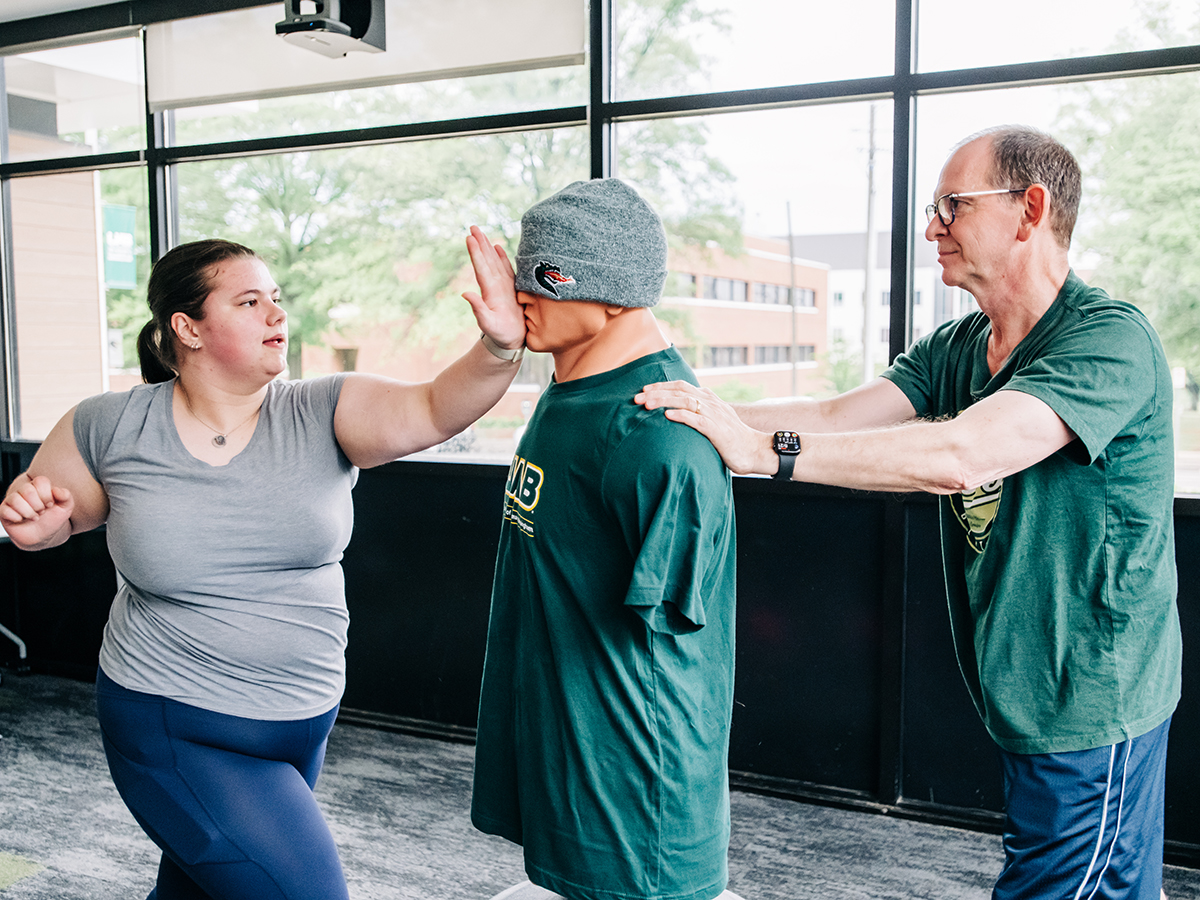 Mark Banaszak Holl, professor in the School of Engineering and a fifth dan master black belt in tae kwon do, works with an Honors College student in an end-of-semester session designed to relieve stress before finals. Photo by Andrea Mabry, UAB Marketing and CommunicationsIn his lab, Professor Mark Banaszak Holl, Ph.D., develops better, cheaper asthma inhalers. After hours, over the past two years, he has focused on breath work of a different kind. Less than a hundred yards away from his office in the School of Engineering’s Hoehn Building, Banaszak Holl, a fifth dan master black belt in tae kwon do, has taught weekly lessons in the Korean martial art to UAB Honors College students as part of the Honors Faculty Fellows Program.
Mark Banaszak Holl, professor in the School of Engineering and a fifth dan master black belt in tae kwon do, works with an Honors College student in an end-of-semester session designed to relieve stress before finals. Photo by Andrea Mabry, UAB Marketing and CommunicationsIn his lab, Professor Mark Banaszak Holl, Ph.D., develops better, cheaper asthma inhalers. After hours, over the past two years, he has focused on breath work of a different kind. Less than a hundred yards away from his office in the School of Engineering’s Hoehn Building, Banaszak Holl, a fifth dan master black belt in tae kwon do, has taught weekly lessons in the Korean martial art to UAB Honors College students as part of the Honors Faculty Fellows Program.
In fine weather, Banaszak Holl and his students would head out to the grass in front of Honors Hall. Passersby were treated to vigorous yelling and, as each semester progressed, the satisfying crunch of pine boards breaking under a student’s forceful punch or kick. “If you can break a pine board, you can break a bone,” Banaszak Holl told students. But breaking boards, as much as students loved it, was not the main focus.
More than anything, Honors Faculty Fellows projects "are opportunities for students to connect with each other," said Honors College Associate Dean Kristine Hurst-Wajszczuk, DMA.
“The whole point is to help people become more aware of the tight connection between motions and emotions,” Banaszak Holl said. “What martial arts do is teach you how to control your body. And you can use that to control your emotions — to calm yourself, bring focus and drive your biochemical responses. We do these breathing exercises in class, and I tell the students, ‘You can do that in your exams, too.’” In fact, every semester, Banaszak Holl’s students insisted on meeting one last time before exams because “they wanted the release going into finals,” he said.
Unique opportunities to connect
The Honors Faculty Fellows Program, which began in 2017, offers honors students extracurricular opportunities to spend time with energetic faculty outside the classroom setting, says Kristine Hurst-Wajszczuk, DMA, associate dean for the Honors College. “But more than anything, these are opportunities for students to connect with each other,” she said. Knitting, journaling, meditation, nature hikes, movie clubs and workshops on health care systems around the globe have all inspired Fellows projects. Hurst-Wajszczuk, an opera singer and Department of Music faculty member, specializes in performance anxiety management. When she was a Faculty Fellow in 2018-19, she taught the meditation sessions. Topics are entirely up to the faculty who apply for Fellows positions; a committee of Honors College students selects the applications that interest them most.
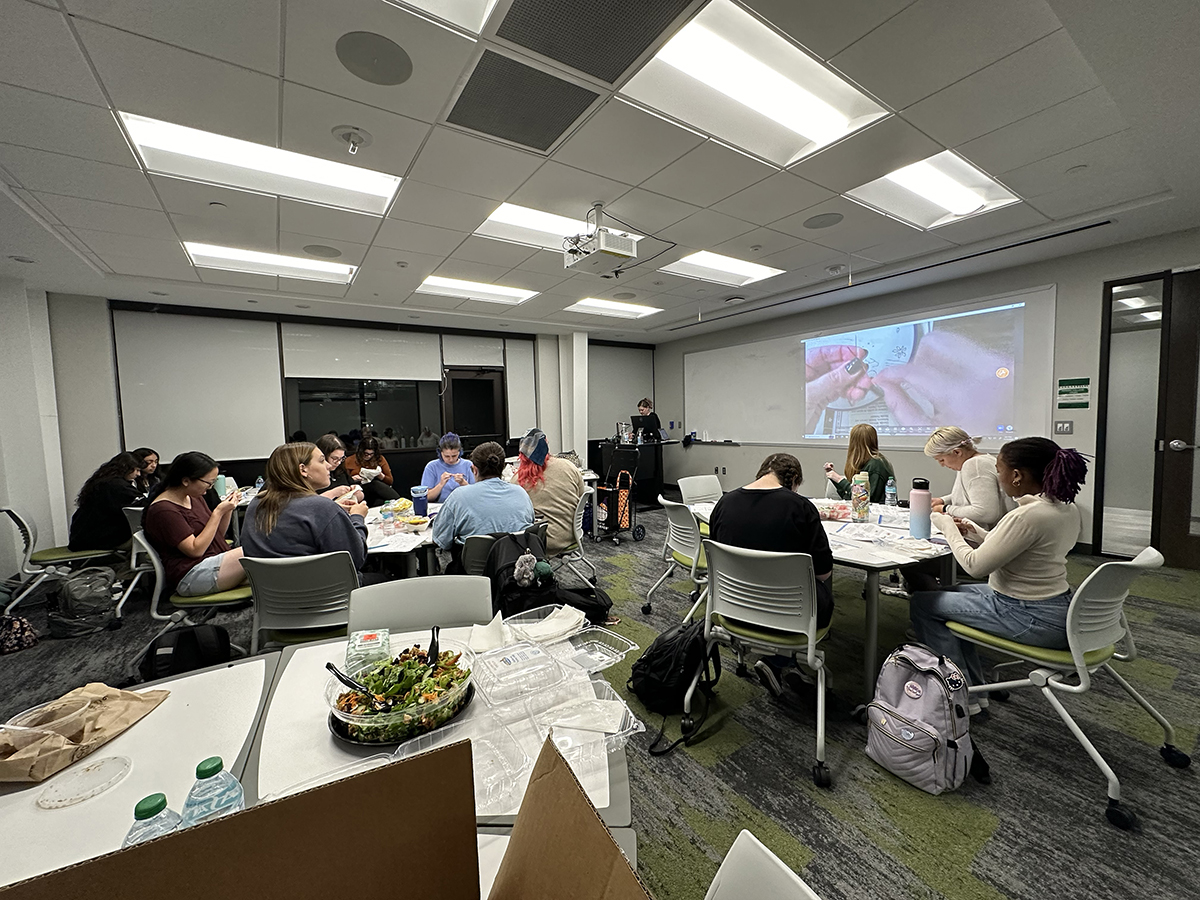 Students at work in a Threads for Thought session taught by Marliese Thomas, assistant professor and Fine Arts Librarian with UAB Libraries. Photo courtesy UAB Honors College
Students at work in a Threads for Thought session taught by Marliese Thomas, assistant professor and Fine Arts Librarian with UAB Libraries. Photo courtesy UAB Honors College
“Several patterns I see are that students are interested largely in things that will offer them stress relief or help them in their creative lives, or that the sessions are in some way preparatory for their careers,” Hurst-Wajszczuk said.
Projects can be renewed for a second year if students respond; some take on new lives of their own. Several of Banaszak Holl’s students have joined the UAB Taekwondo Club, a student organization, to continue to hone their skills. Another example: In the 2019-2020 Faculty Fellows cohort, Robin Lanzi, Ph.D., a professor in the School of Public Health, taught sessions on such subjects as emergency mental health training and active listening to help students promote better mental health among their peers. That group became an official UAB student organization, UAB Mental Health Ambassadors, and helped provide invaluable student support during the pandemic.
“Experiential learning is a hallmark of the Honors College,” Hurst-Wajszczuk said. “Before classes begin, all incoming Honors freshmen participate in a three-day Honors Retreat. One of the activities is City as Text, when small groups of students visit various neighborhoods across the city and report back on what they see,” she said. “They note the buildings, the transportation, how people are dressed, if they appear to be going to work, if they are willing to talk to you, etc. In many ways, this hands-on kind of learning sets the tone for students’ entire Honors experience. Our seminars are largely less traditional lecture format, but rather discussion-based and much more interactive. Everything we do in the Honors College — from our New Student Retreat to our Leadership Academy, to our seminars — has some experiential learning component. That makes the Faculty Fellows Program very much a part of our culture.”
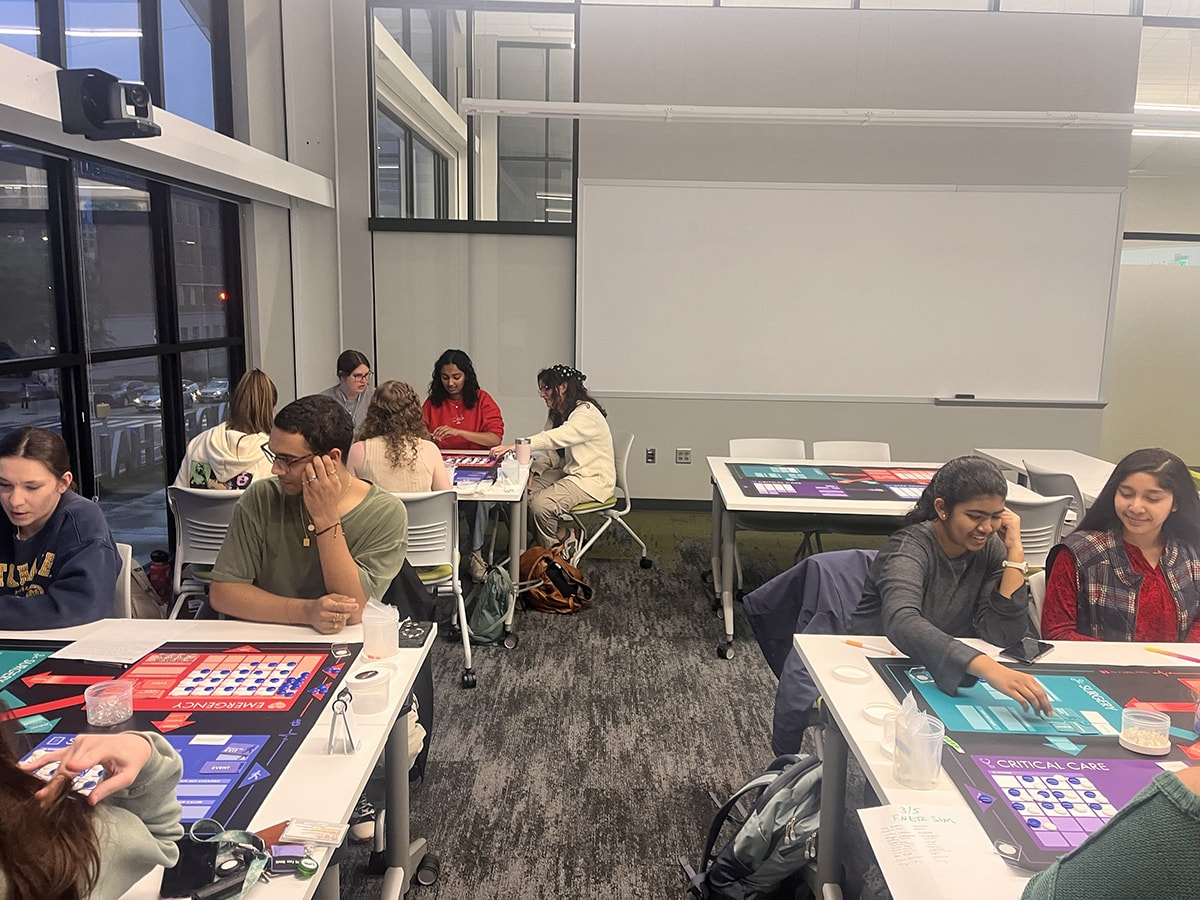 Balancing limited resources and unexpected events is all part of the challenge in the tabletop simulation Friday Night at the ER, part of the Experiential Learning Through Simulation offering by Heather Lee, DrPH, assistant professor in the School of Health Professions. Photo courtesy UAB Honors College
Balancing limited resources and unexpected events is all part of the challenge in the tabletop simulation Friday Night at the ER, part of the Experiential Learning Through Simulation offering by Heather Lee, DrPH, assistant professor in the School of Health Professions. Photo courtesy UAB Honors College
What you learn on a Friday night at the ER
In addition to Banaszak Holl’s tae kwon do project, one offering in 2023-24 was Experiential Learning Through Simulation, led by Heather Lee, DrPH, assistant professor in the Department of Health Services Administration in the School of Health Professions. Simulations can develop and enhance complex decision-making skills, Lee pointed out in her project proposal. Plus, she said, “They are a very useful format of experiential learning; undergraduate students in particular love the hands-on nature of these experiences.”
Honors College students are "highly engaged, and they expect a lot from you,” said Heather Lee, DrPH, assistant professor in the Department of Health Services Administration. “It is challenging; their expectations are higher, and they are also going to perform at that higher level. For me, as a faculty member, that is very enjoyable.”
Most of the simulations Lee used over her two years as an Honors Faculty Fellow are “tabletop” sims, which resemble board games. After a meal, students spread out in groups, tokens and cards in hand, to tackle such experiences as Friday Night at the ER. This popular sim challenges learners to manage a hectic hospital over 24 hours, balancing limited resources, surges in demand, time pressures and unexpected events. “Although it is set in a hospital, it really is just a great introduction to systems thinking and how changes in one area ripple out to affect everything else,” Lee said. Another student favorite is the Opioid Simulation. Developed at UAB, it gives learners an opportunity to experience the struggles of living with opioid use disorder to increase empathy and decrease stigma. “It is a heavy topic; but it generates deep, robust discussions,” Lee said. “Students become totally invested in it.”
In her second year as a Faculty Fellow, Lee added in another UAB-developed sim, which she calls the Lego Simulation. Learners must navigate their Lego figures through various stations in a clinic setting as quickly as possible. “You are moving around a lot, playing different roles and trying to get patients to all the care they need,” Lee said. “The students run through it once, and it is timed; then they get together and decide what to do for the second round to make the care more efficient and effective. It teaches you how important communication can be.”
The Faculty Fellows Program “was a really fun experience,” for the students and for her, Lee said. As are the graduate students she works with in UAB’s master’s program in health administration, Honors College students “are also highly engaged, and they expect a lot from you,” she said. “It is challenging; their expectations are higher, and they are also going to perform at that higher level. For me, as a faculty member, that is very enjoyable.”
Another benefit of the project was getting to expose students to concepts of health care management. “People grow up thinking, ‘I want to be a doctor’ or ‘I want to be a nurse’; but they don’t tend to discover my field until much later,” Lee said. “This was a chance to introduce them to the field as well as the power of simulations and some of the great simulation-based resources we have at the university.”
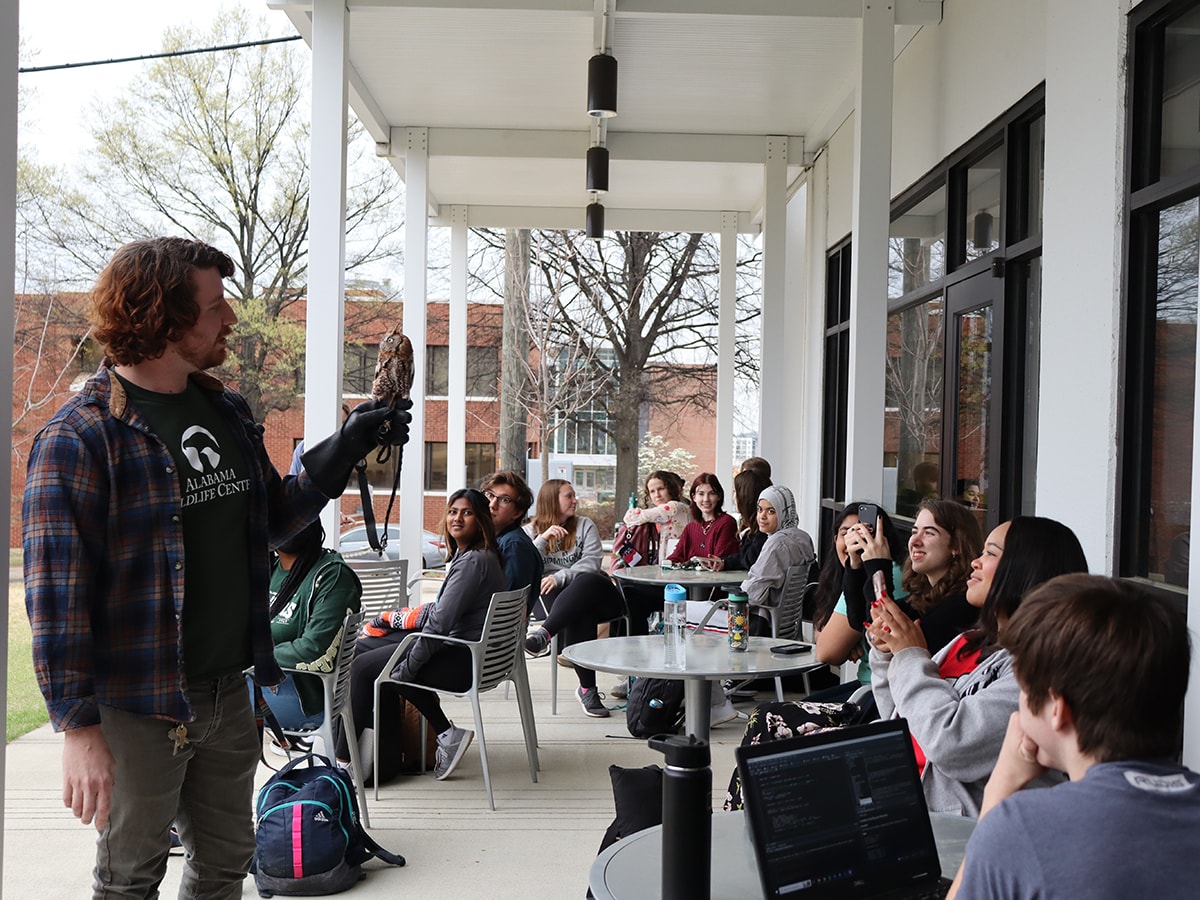 Participants meet a very photogenic owl as part of Inspired to Serve, taught by Peter Jones, Ph.D., associate professor in the Department of Political Science and Public Administration. Photo courtesy UAB Honors College
Participants meet a very photogenic owl as part of Inspired to Serve, taught by Peter Jones, Ph.D., associate professor in the Department of Political Science and Public Administration. Photo courtesy UAB Honors College
Walks to remember
In the 2021-2022 cohort, Department of Philosophy faculty member (now chair) Kevin McCain, Ph.D., offered sessions called Philosophy Walk and Talk. Starting at a campus gathering spot, McCain led groups of as many as 20 students on strolls to Railroad Park, Five Points, along the Vulcan Trail and more. As they walked, “we talked about things like personal identity — what is it that makes us the same person over time? — and external world skepticism — how can we know anything about the world around us?” McCain said. Other topics included free will and what makes for a good life. Although there were some regular attenders, it was mostly a new group each walk. “They expressed each time how much they enjoyed thinking and talking about philosophy,” McCain said. The experience was enjoyable for him as well, he added: “Honors students are, of course, bright students. But interacting in an informal setting really allowed me to see how inquisitive they are as well.“
A colleague who had been an Honors Faculty Fellow inspired McCain to give it a try. “It sounded like a lot of fun and a great way to help students who may not end up in a philosophy class see that philosophical questions are worth thinking about and discussing,” he said.
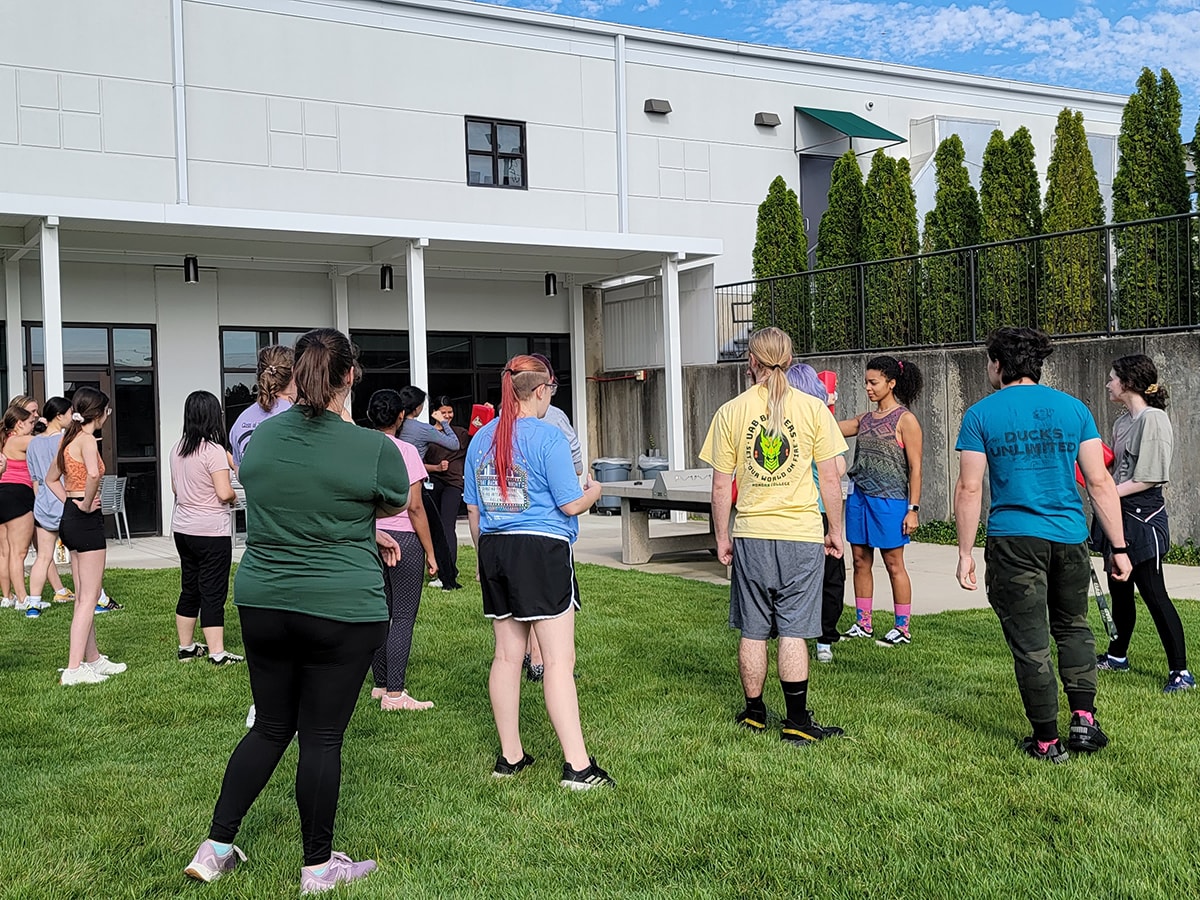 Fine weather brings students outside to practice their tae kwon do skills with Banaszak Holl. Photo courtesy UAB Honors College
Fine weather brings students outside to practice their tae kwon do skills with Banaszak Holl. Photo courtesy UAB Honors College
Banaszak Holl learned about the program soon after he arrived at UAB in 2022 with his wife, Jane Banaszak Holl, Ph.D., chair of the Department of Health Services Administration. She also holds a black belt in tae kwon do. It was the perfect opportunity to do something he had always wanted to do but never found the chance to try at his previous institutions: teach martial arts in a university context. “Universities in general only get to focus on a part of the person,” Banaszak Holl said. “This allowed me to teach the whole person, body and mind. My wife is a high-level martial artist; she can pick out the ones who have been coming regularly, because they move differently than the other students.”
The Honors Faculty Fellows Program continues to grow. The 2025-2026 cohort received the most applications of any so far, Hurst-Wajszczuk says (see the full list of faculty selected in this cohort below). McCain has advice for fellow faculty who may be thinking about applying to the next cohort. “Don’t overthink it,” he said. “Propose an activity you enjoy that allows for conversation. And, if you have the good fortune of being selected as an Honors Faculty Fellow, get ready to have deep discussions full of insights from some of UAB’s best and brightest.”
2025-2026 Honors Faculty Fellows:
C. Allen Gorman, Ph.D., Collat School of Business
Gorman, associate professor in the Department of Management, Information Systems and Quantitative Methods, will connect honors students with local business leaders during visits to prominent companies across the city as part of a Birmingham Leadership Lab experience.
Ling Ma, Ph.D., College of Arts and Sciences
Ma, instructor in the Department of World Languages and Literatures, will lead students in an exploration of community cultural festivals, including analysis of food traditions, performing arts, arts and crafts, spiritual practices, and costume and clothing.
Sandra Wang-Harris, O.D., School of Optometry
Wang-Harris, associate professor in the Department of Optometry and Vision Science, will engage students in programs at the Lakeshore Foundation, including recreational activities, cooking classes, and measuring health and strength in the Sports Science and Performance Center.
Keisha Brown, O.D., School of Optometry
Brown, assistant professor in the Department of Optometry and Vision Science, will provide participants with a comprehensive introduction to optometry, including case-based learning, clinical shadowing and hands-on experience performing vision screenings in the Birmingham community.
Cindy Cain, Ph.D., College of Arts and Sciences
Cain, associate professor in the Department of Sociology, will provide basic guidance on creative techniques, including collage, sculpture, crochet and drawing, and show examples of how these techniques have been used to prompt conversations and advocate for social action.
Reginald Jackson, Ed.D., College of Arts and Sciences
Jackson, assistant professor in the Department of Music, will teach students the history and fundamentals of gospel choir singing, including the elements of improvisation, call and response, swaying, and three-part singing, with sessions covering various styles of gospel music.
Phil Cendoma, Ph.D., School of Health Professions
Cendoma, assistant professor in the Department of Health Services Administration, will offer students a foundational understanding of personal finance concepts and practical strategies for managing finances effectively to align with their short-term and long-term goals.